
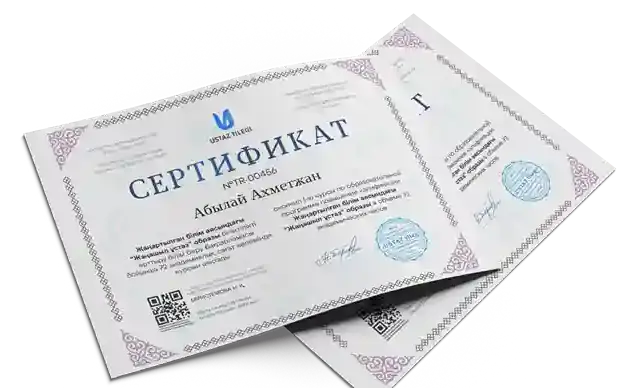
The Past Indefinite Tense
Дипломдар мен сертификаттарды алып үлгеріңіз!

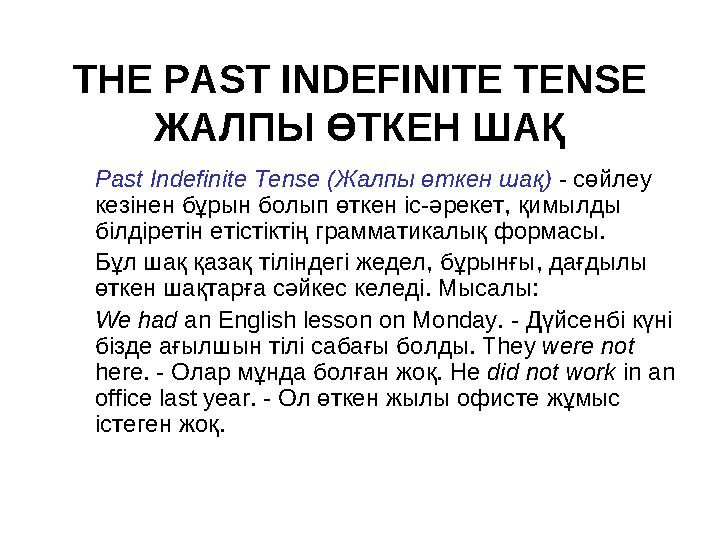



1 слайд
THE PAST INDEFINITE TENSE
ЖАЛПЫ ӨТКЕН ШАҚ
Past Indefinite Tense (Жалпы өткен шақ) - сөйлеу
кезінен бұрын болып өткен іс-əрекет, қимылды
білдіретін етістіктің грамматикалық формасы.
Бұл шақ қазақ тіліндегі жедел, бұрынғы, дағдылы
өткен шақтарға сəйкес келеді. Мысалы:
We had an English lesson on Monday. - Дүйсенбі күні
бізде ағылшын тілі сабағы болды. They were not
here. - Олар мұнда болған жоқ. Не did not work in an
office last year. - Ол өткен жылы офисте жұмыс
істеген жоқ.
1 слайд
THE PAST INDEFINITE TENSE ЖАЛПЫ ӨТКЕН ШАҚ Past Indefinite Tense (Жалпы өткен шақ) - сөйлеу кезінен бұрын болып өткен іс-əрекет, қимылды білдіретін етістіктің грамматикалық формасы. Бұл шақ қазақ тіліндегі жедел, бұрынғы, дағдылы өткен шақтарға сəйкес келеді. Мысалы: We had an English lesson on Monday. - Дүйсенбі күні бізде ағылшын тілі сабағы болды. They were not here. - Олар мұнда болған жоқ. Не did not work in an office last year. - Ол өткен жылы офисте жұмыс істеген жоқ.
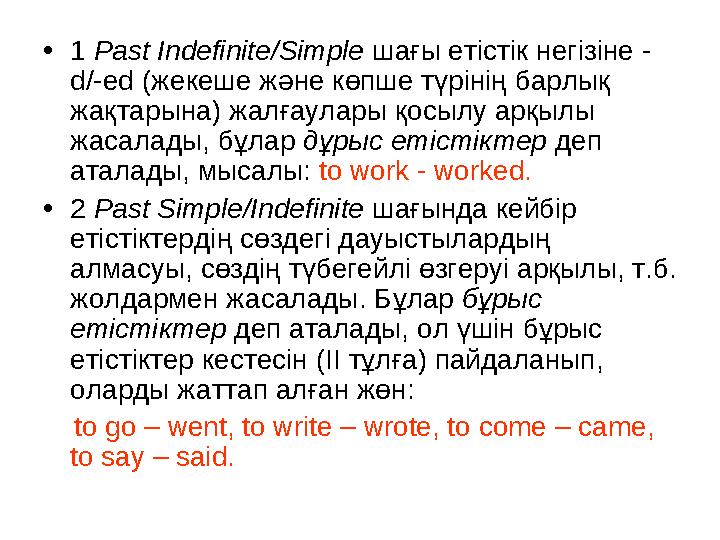
2 слайд
•1 Past Indefinite/Simple шағы етістік негізіне -
d/-ed (жекеше жəне көпше түрінің барлық
жақтарына) жалғаулары қосылу арқылы
жасалады, бұлар дұрыс етістіктер деп
аталады, мысалы: to work - worked.
•2 Past Simple/Indefinite шағында кейбір
етістіктердің сөздегі дауыстылардың
алмасуы, сөздің түбегейлі өзгеруі арқылы, т.б.
жолдармен жасалады. Бұлар бұрыс
етістіктер деп аталады, ол үшін бұрыс
етістіктер кестесін (II тұлға) пайдаланып,
оларды жаттап алған жөн:
to go – went, to write – wrote, to come – came,
to say – said.
2 слайд
•1 Past Indefinite/Simple шағы етістік негізіне - d/-ed (жекеше жəне көпше түрінің барлық жақтарына) жалғаулары қосылу арқылы жасалады, бұлар дұрыс етістіктер деп аталады, мысалы: to work - worked. •2 Past Simple/Indefinite шағында кейбір етістіктердің сөздегі дауыстылардың алмасуы, сөздің түбегейлі өзгеруі арқылы, т.б. жолдармен жасалады. Бұлар бұрыс етістіктер деп аталады, ол үшін бұрыс етістіктер кестесін (II тұлға) пайдаланып, оларды жаттап алған жөн: to go – went, to write – wrote, to come – came, to say – said.
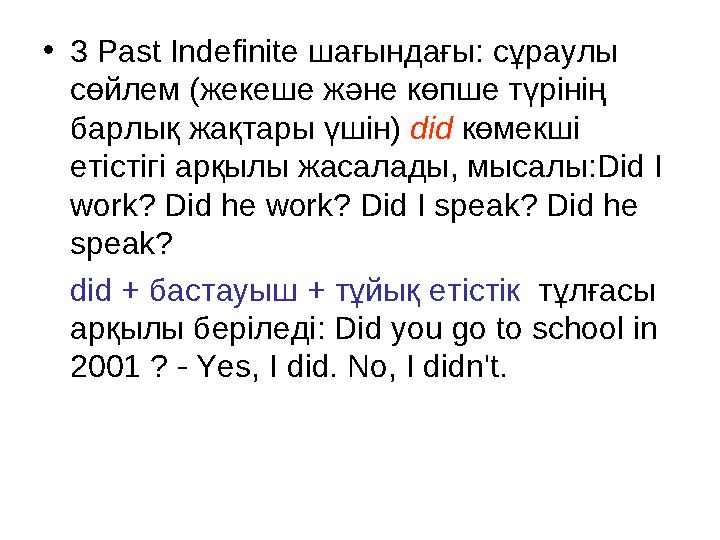
3 слайд
•3 Past Indefinite шағындағы: сұраулы
сөйлем (жекеше және көпше түрінің
барлық жақтары үшін) did көмекші
етістігі арқылы жасалады, мысалы:Did I
work? Did he work? Did I speak? Did he
speak?
did + бастауыш + тұйық етістік тұлғасы
арқылы беріледі: Did you go to school in
2001 ? - Yes, I did. No, I didn't.
3 слайд
•3 Past Indefinite шағындағы: сұраулы сөйлем (жекеше және көпше түрінің барлық жақтары үшін) did көмекші етістігі арқылы жасалады, мысалы:Did I work? Did he work? Did I speak? Did he speak? did + бастауыш + тұйық етістік тұлғасы арқылы беріледі: Did you go to school in 2001 ? - Yes, I did. No, I didn't.
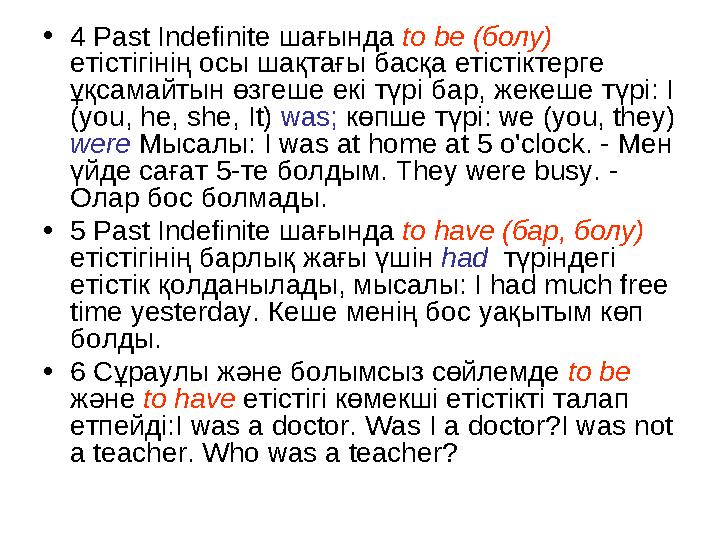
4 слайд
•4 Past Indefinite шағында to be (болу)
етістігінің осы шақтағы басқа етістіктерге
ұқсамайтын өзгеше екі түрі бар, жекеше түрі: I
(you, he, she, It) was; көпше түрі: we (you, they)
were Мысалы: I was at home at 5 o'clock. - Мен
үйде сағат 5-те болдым. They were busy. -
Олар бос болмады.
•5 Past Indefinite шағында to have (бар, болу)
етістігінің барлық жағы үшін had түріндегі
етістік қолданылады, мысалы: I had much free
time yesterday. Кеше менің бос уақытым көп
болды.
•6 Сұраулы жəне болымсыз сөйлемде to be
жəне to have етістігі көмекші етістікті талап
етпейді:I was a doctor. Was I a doctor?I was not
a teacher. Who was a teacher?
4 слайд
•4 Past Indefinite шағында to be (болу) етістігінің осы шақтағы басқа етістіктерге ұқсамайтын өзгеше екі түрі бар, жекеше түрі: I (you, he, she, It) was; көпше түрі: we (you, they) were Мысалы: I was at home at 5 o'clock. - Мен үйде сағат 5-те болдым. They were busy. - Олар бос болмады. •5 Past Indefinite шағында to have (бар, болу) етістігінің барлық жағы үшін had түріндегі етістік қолданылады, мысалы: I had much free time yesterday. Кеше менің бос уақытым көп болды. •6 Сұраулы жəне болымсыз сөйлемде to be жəне to have етістігі көмекші етістікті талап етпейді:I was a doctor. Was I a doctor?I was not a teacher. Who was a teacher?
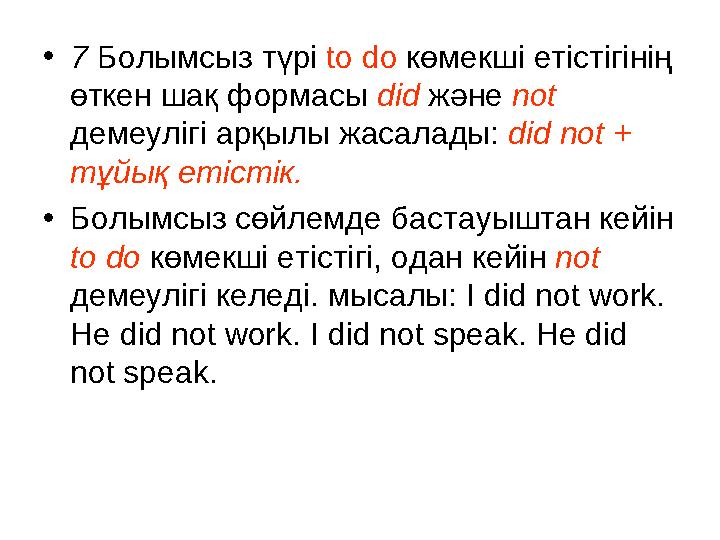
5 слайд
•7 Болымсыз түрі to do көмекші етістігінің
өткен шақ формасы did жəне not
демеулігі арқылы жасалады: did not +
тұйық етістік.
•Болымсыз сөйлемде бастауыштан кейін
to do көмекші етістігі, одан кейін not
демеулігі келеді. мысалы: I did not work.
Не did not work. I did not speak. He did
not speak.
5 слайд
•7 Болымсыз түрі to do көмекші етістігінің өткен шақ формасы did жəне not демеулігі арқылы жасалады: did not + тұйық етістік. •Болымсыз сөйлемде бастауыштан кейін to do көмекші етістігі, одан кейін not демеулігі келеді. мысалы: I did not work. Не did not work. I did not speak. He did not speak.
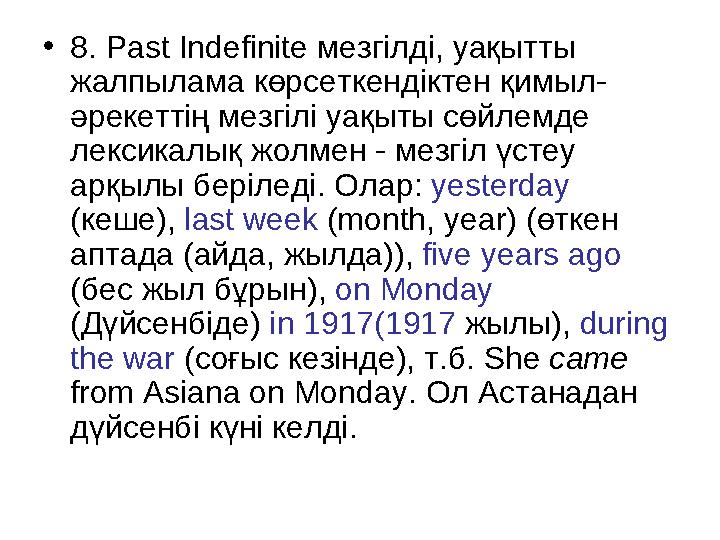
6 слайд
•8. Past Indefinite мезгілді, уақытты
жалпылама көрсеткендіктен қимыл-
əрекеттің мезгілі уақыты сөйлемде
лексикалық жолмен - мезгіл үстеу
арқылы беріледі. Олар: yesterday
(кеше), last week (month, year) (өткен
аптада (айда, жылда)), five years ago
(бес жыл бұрын), on Monday
(Дүйсенбіде) in 1917(1917 жылы), during
the war (соғыс кезінде), т.б. She came
from Asiana on Monday. Ол Астанадан
дүйсенбі күні келді.
6 слайд
•8. Past Indefinite мезгілді, уақытты жалпылама көрсеткендіктен қимыл- əрекеттің мезгілі уақыты сөйлемде лексикалық жолмен - мезгіл үстеу арқылы беріледі. Олар: yesterday (кеше), last week (month, year) (өткен аптада (айда, жылда)), five years ago (бес жыл бұрын), on Monday (Дүйсенбіде) in 1917(1917 жылы), during the war (соғыс кезінде), т.б. She came from Asiana on Monday. Ол Астанадан дүйсенбі күні келді.
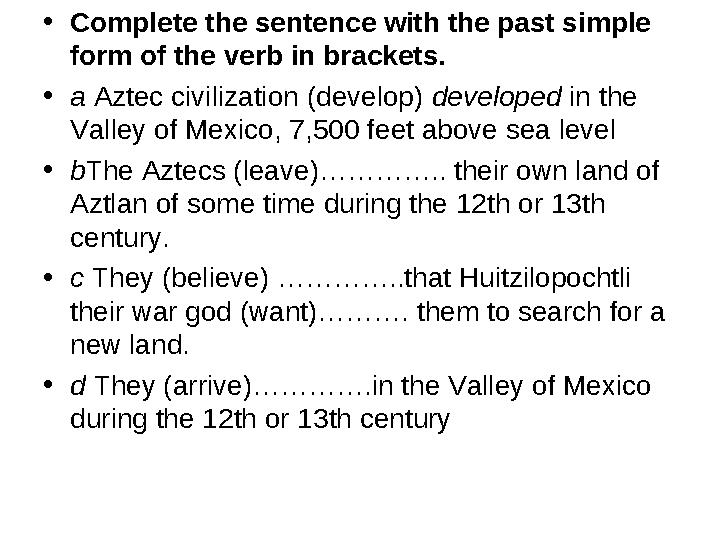
7 слайд
•Complete the sentence with the past simple
form of the verb in brackets.
•a Aztec civilization (develop) developed in the
Valley of Mexico, 7,500 feet above sea level
•bThe Aztecs (leave)………….. their own land of
Aztlan of some time during the 12th or 13th
century.
•c They (believe) …………..that Huitzilopochtli
their war god (want)………. them to search for a
new land.
•d They (arrive)………….in the Valley of Mexico
during the 12th or 13th century
7 слайд
•Complete the sentence with the past simple form of the verb in brackets. •a Aztec civilization (develop) developed in the Valley of Mexico, 7,500 feet above sea level •bThe Aztecs (leave)………….. their own land of Aztlan of some time during the 12th or 13th century. •c They (believe) …………..that Huitzilopochtli their war god (want)………. them to search for a new land. •d They (arrive)………….in the Valley of Mexico during the 12th or 13th century
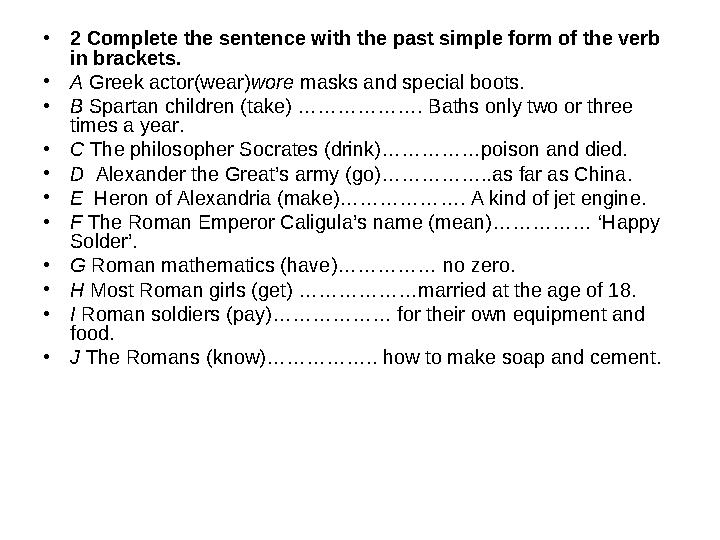
8 слайд
•2 Complete the sentence with the past simple form of the verb
in brackets.
•A Greek actor(wear)wore masks and special boots.
•B Spartan children (take) ………………. Baths only two or three
times a year.
•C The philosopher Socrates (drink)……………poison and died.
•D Alexander the Great’s army (go)……………..as far as China.
•E Heron of Alexandria (make)………………. A kind of jet engine.
•F The Roman Emperor Caligula’s name (mean)…………… ‘Happy
Solder’.
•G Roman mathematics (have)…………… no zero.
•H Most Roman girls (get) ………………married at the age of 18.
•I Roman soldiers (pay)……………… for their own equipment and
food.
•J The Romans (know)…………….. how to make soap and cement.
8 слайд
•2 Complete the sentence with the past simple form of the verb in brackets. •A Greek actor(wear)wore masks and special boots. •B Spartan children (take) ………………. Baths only two or three times a year. •C The philosopher Socrates (drink)……………poison and died. •D Alexander the Great’s army (go)……………..as far as China. •E Heron of Alexandria (make)………………. A kind of jet engine. •F The Roman Emperor Caligula’s name (mean)…………… ‘Happy Solder’. •G Roman mathematics (have)…………… no zero. •H Most Roman girls (get) ………………married at the age of 18. •I Roman soldiers (pay)……………… for their own equipment and food. •J The Romans (know)…………….. how to make soap and cement.
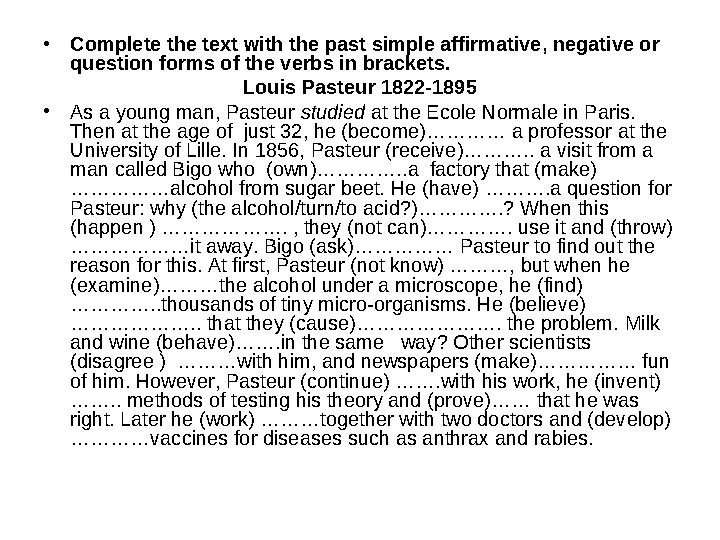
9 слайд
•Complete the text with the past simple affirmative, negative or
question forms of the verbs in brackets.
Louis Pasteur 1822-1895
•As a young man, Pasteur studied at the Ecole Normale in Paris.
Then at the age of just 32, he (become)………… a professor at the
University of Lille. In 1856, Pasteur (receive)……….. a visit from a
man called Bigo who (own)…………..а factory that (make)
……………alcohol from sugar beet. He (have) ……….a question for
Pasteur: why (the alcohol/turn/to acid?)………….? When this
(happen ) ………………. , they (not can)…………. use it and (throw)
………………it away. Bigo (ask)…………… Pasteur to find out the
reason for this. At first, Pasteur (not know) ………, but when he
(examine)………the alcohol under a microscope, he (find)
…………..thousands of tiny micro-organisms. He (believe)
……………….. that they (cause)…………………. the problem. Milk
and wine (behave)…….in the same way? Other scientists
(disagree ) ………with him, and newspapers (make)…………… fun
of him. However, Pasteur (continue) …….with his work, he (invent)
…….. methods of testing his theory and (prove)…… that he was
right. Later he (work) ………together with two doctors and (develop)
…………vaccines for diseases such as anthrax and rabies.
9 слайд
•Complete the text with the past simple affirmative, negative or question forms of the verbs in brackets. Louis Pasteur 1822-1895 •As a young man, Pasteur studied at the Ecole Normale in Paris. Then at the age of just 32, he (become)………… a professor at the University of Lille. In 1856, Pasteur (receive)……….. a visit from a man called Bigo who (own)…………..а factory that (make) ……………alcohol from sugar beet. He (have) ……….a question for Pasteur: why (the alcohol/turn/to acid?)………….? When this (happen ) ………………. , they (not can)…………. use it and (throw) ………………it away. Bigo (ask)…………… Pasteur to find out the reason for this. At first, Pasteur (not know) ………, but when he (examine)………the alcohol under a microscope, he (find) …………..thousands of tiny micro-organisms. He (believe) ……………….. that they (cause)…………………. the problem. Milk and wine (behave)…….in the same way? Other scientists (disagree ) ………with him, and newspapers (make)…………… fun of him. However, Pasteur (continue) …….with his work, he (invent) …….. methods of testing his theory and (prove)…… that he was right. Later he (work) ………together with two doctors and (develop) …………vaccines for diseases such as anthrax and rabies.




